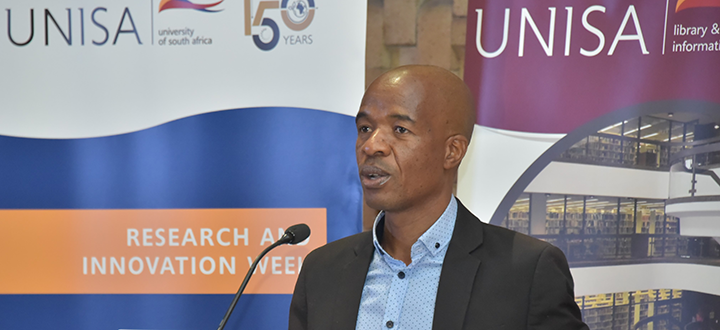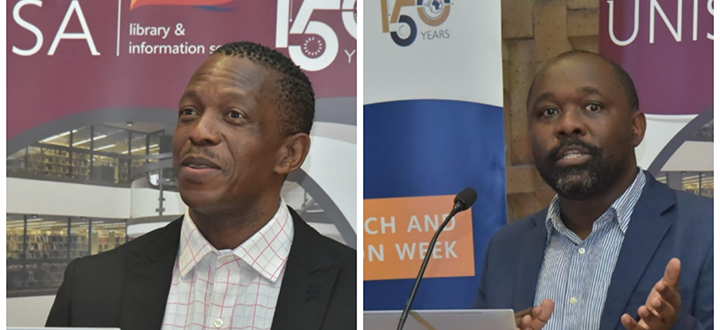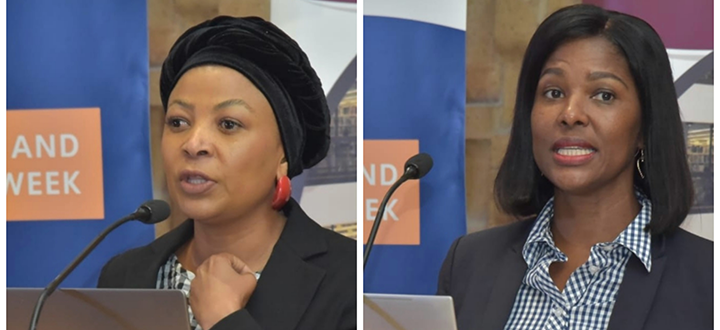
On 24 May 2024, scholars, researchers, students and librarians met to discuss topics related to the theme "Libraries bridging the gap between science and society". Segametsi Molawa and Oscar Manamela, who were the programme directors for the day, posed critical questions about whether research has an impact on society and whether innovation is reaching the community at large.

Prof Mpho Ngoepe, Executive Director of Unisa Library and Information Services
Professor Mpho Ngoepe, Executive Director of Unisa Library and Information Services (LIS), delivered the welcome address, and emphasised that research is being conducted, but public libraries in South Africa are insufficient as sources of information. Academic libraries and institutions are frequently viewed as ivory towers. This aspect, in combination with other challenges, such as the high prices of books and journals, makes it difficult for society at large to access information. Therefore, libraries should act as a bridge between universities and research institutions by eliminating unfair practices, inequalities in publishing and biases based on geography, language and peer review.
According to Ngoepe, open access can influence peer review by making content accessible to anyone with internet access, thereby bridging the gap between science and society. He was pleased to point out that Unisa LIS is also working to close the gap by collaborating with municipalities and other higher education institutions near the regional centres to share facilities.
Libraries undergo digital transformation
The City of Johannesburg is one of the municipalities that has a partnership with Unisa LIS. Jeff Nyoka from the City of Johannesburg's libraries shared their digital transformation journey, which was about changing communities' lives. He said that the City of Johannesburg's libraries had started offering free online courses to assist young people whose circumstances prevented them from enrolling in colleges or universities. Additionally, as libraries undergo digital transformation, their primary goal is to close the gap between technology and society by providing programmes on various forms of digital literacy that equip local communities with digital skills.

(From left) Dr Daniel Mosako and Jeff Nyoka
Dr Daniel Mosako delved into the profound impact of the different industrial revolutions from the 18th century to the 21st century, and explained that library spaces are being replaced by digital libraries that facilitate quicker services and increase accessibility. According to Mosako, the relationship between society and the environment is shifting towards digital technology, and as the Internet of Things becomes more prevalent, libraries should focus on digital technology. He also discussed the importance of leveraging artificial intelligence in libraries and fostering collaboration. He pointed out that libraries should not be isolated but rather collaborative by allowing people to communicate with machines since we are moving faster into the fifth industrial revolution, where innovation will be crucial.
Academic librarians as catalysts for citizen science
The discussions expanded to the contributions of academic librarians to bridge the gap between science and society. Dr Modiehi Rammutloa presented the results of her PhD research project on the role of academic librarians as catalysts in citizen science activities. Rammutloa explained citizen science as a collaboration of untrained community members and researchers to answer real-world questions.
She further explained that citizen science involved volunteers and seasoned researchers. Rammutloa acknowledged that, while there is a growing interest in citizen science and its importance in research, there is still a lack of understanding of what the phenomenon entails especially in the LIS field in South Africa. Her main concern was that a copious amount of data is produced from various projects, however, only a privileged few individuals access the data. Access to data is a gap that academic librarians need to fill as their mandate is the provision of access to information and by extension data as well. She developed a framework to assist academic librarians in positioning themselves in citizen science activities, as well as ensuring that the data is properly managed and accessible.

(From left) Zanele Nomvete and Dr Modiehi Rammutloa
Databases and research tools
Clarivate and Elsevier, service providers that support parts of the Unisa LIS databases and research tools, were invited by Unisa LIS to showcase their resources and the role they play in bridging the gap between science and society. Zanele Nomvete, a Clarivate representative, and Daneshree Moodley, an Elsevier representative, showcased the diverse services and innovations of these service providers and highlighted their crucial role in supporting libraries with e-books and digital journal platforms as part of connecting science and society. By collaborating with resource providers, Unisa LIS will remain at the forefront of information access and serve as an important link between science and society.
Click here to view a recording of the event
* By Busisiwe Manala, Unisa Library and Information Services*
0 Comments.